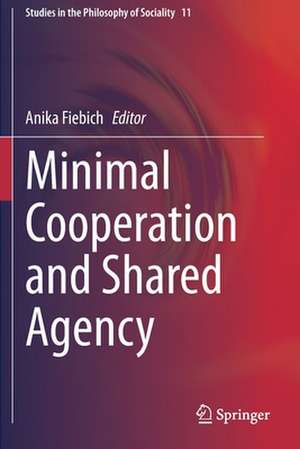Minimal Cooperation and Shared Agency: Studies in the Philosophy of Sociality, cartea 11
Editat de Anika Fiebichen Limba Engleză Paperback – 26 aug 2021
The main accounts in this debate present sufficient rather than necessary or minimal criteria for there to be cooperation. Much discussion in the debate deals with robust rather than more attenuate and simple cases of cooperation or shared agency. Focusing on such minimal cases, however, may help to explain how cooperation comes into existence and how minimal cooperation interrelates with more complex cases of cooperation.
The contributors discuss minimality in cooperation by focusing on particular aspects. For example, they consider how social roles might deliver minimal cooperation constraints or what the minimal contextual criteria are for cooperation to emerge.
Readers will find the answers to these and other questions: What is minimally cooperative behavior? By what steps could full members of a society organized by conventions, norms and institutions be constructed from creatures with minimal social skills and cognitive abilities? What do we experience of actions when we act together with a purpose?
| Toate formatele și edițiile | Preț | Express |
|---|---|---|
| Paperback (1) | 777.69 lei 43-57 zile | |
| Springer International Publishing – 26 aug 2021 | 777.69 lei 43-57 zile | |
| Hardback (1) | 783.68 lei 43-57 zile | |
| Springer International Publishing – 24 iun 2020 | 783.68 lei 43-57 zile |
Preț: 777.69 lei
Preț vechi: 948.40 lei
-18% Nou
Puncte Express: 1167
Preț estimativ în valută:
148.81€ • 155.76$ • 123.86£
148.81€ • 155.76$ • 123.86£
Carte tipărită la comandă
Livrare economică 31 martie-14 aprilie
Preluare comenzi: 021 569.72.76
Specificații
ISBN-13: 9783030297855
ISBN-10: 3030297853
Ilustrații: V, 217 p. 5 illus.
Dimensiuni: 155 x 235 mm
Greutate: 0.32 kg
Ediția:1st ed. 2020
Editura: Springer International Publishing
Colecția Springer
Seria Studies in the Philosophy of Sociality
Locul publicării:Cham, Switzerland
ISBN-10: 3030297853
Ilustrații: V, 217 p. 5 illus.
Dimensiuni: 155 x 235 mm
Greutate: 0.32 kg
Ediția:1st ed. 2020
Editura: Springer International Publishing
Colecția Springer
Seria Studies in the Philosophy of Sociality
Locul publicării:Cham, Switzerland
Cuprins
Chapter 1. Minimal Cooperation and Shared Agency (Anika Fiebich).- Part I. Minimal Cooperation.- Chapter 2. What is Minimally Cooperative Behaviour? (Kirk Ludwig).- Chapter 3. Social Groups, Roles, and Cooperation (Katherine Ritchie).- Chapter 4. Conversation, Context, and Joint Action (Shaun Gallagher).- Chapter 5. Towards a Blueprint for a Social Animal (Stephen Butterfill).- Chapter 6. Natural Intersubjectivity and Minimal Cooperation (Michael Wilby).- Chapter 7. Emerging Joint Actions (Cédric Paternotte).- Part II. Minimal Shared Agency.- Chapter 8. Shared Intention: If It Is “lite”, Then It Is Dark (Thomas Smith).- Chapter 9. What do We Experience of Actions When We Act Together With a Purpose? (Corrado Sinigaglia).- Chapter 10. Shared Agency and the Cooperative Evolutionary Thesis (Glenda Satne).- Chapter 11. Group Metamemory: Does Collaborative Remembering Imply Group Metacognition? (Santiago Arango-Munoz).- Chapter 12. Proprietary Reasons and Shared Agency (Abraham Roth).- Chapter 13. The Cognitive Basis of Institutions (Francesco Guala).
Notă biografică
Anika Fiebich has finished her Ph.D. in philosophy on “Varieties of Social Understanding” in 2013 at the Ruhr-University Bochum, Germany, under the supervision of Prof. Albert Newen (Bochum) and Prof. Shaun Gallagher (Memphis). Her research focuses on various issues in the philosophy of mind and action. During her Ph.D. and postdoc time, she has worked at the Ruhr-University Bochum, École Normale Superièure in Lyon, Institut Jean Nicod in Paris, University of Memphis, University of Wollongong, Duisburg-Essen University, and the Center for the Study of Social Action at the University of Milan.
Textul de pe ultima copertă
This volume examines minimality in cooperation and shared agency from various angles. It features essays written by top scholars in the philosophy of mind and action. Taken together, the essays provide a genuine contribution to the contemporary joint action debate.
The main accounts in this debate present sufficient rather than necessary or minimal criteria for there to be cooperation. Much discussion in the debate deals with robust rather than more attenuate and simple cases of cooperation or shared agency. Focusing on such minimal cases, however, may help to explain how cooperation comes into existence and how minimal cooperation interrelates with more complex cases of cooperation.
The contributors discuss minimality in cooperation by focusing on particular aspects. For example, they consider how social roles might deliver minimal cooperation constraints or what the minimal contextual criteria are for cooperation to emerge.
Readers will find the answers to these and other questions: What is minimally cooperative behavior? By what steps could full members of a society organized by conventions, norms and institutions be constructed from creatures with minimal social skills and cognitive abilities? What do we experience of actions when we act together with a purpose?
The main accounts in this debate present sufficient rather than necessary or minimal criteria for there to be cooperation. Much discussion in the debate deals with robust rather than more attenuate and simple cases of cooperation or shared agency. Focusing on such minimal cases, however, may help to explain how cooperation comes into existence and how minimal cooperation interrelates with more complex cases of cooperation.
The contributors discuss minimality in cooperation by focusing on particular aspects. For example, they consider how social roles might deliver minimal cooperation constraints or what the minimal contextual criteria are for cooperation to emerge.
Readers will find the answers to these and other questions: What is minimally cooperative behavior? By what steps could full members of a society organized by conventions, norms and institutions be constructed from creatures with minimal social skills and cognitive abilities? What do we experience of actions when we act together with a purpose?
Caracteristici
Examines minimality in cooperation and shared agency from various angles Features essays written by top scholars in the philosophy of mind and action Explores how cooperation and shared agency come into existence and how they interrelate with more complex cases












